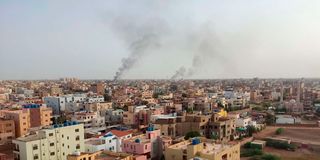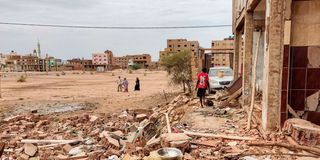Prime
Sudan war: How China and Russia are involved

A man inspects damage as he walks through the rubble in a damaged room at a house that was hit by an artillery shell in the Azhari district in the south of Khartoum on June 6, 2023. The Sudan conflict has amplified concerns from the US and other countries about the roles Russia and China are playing in Africa.
As clashes continue between the Sudanese military and rapid support forces, the current and historic role of foreign governments in Sudanese affairs is under close examination.
Unsurprisingly, the Sudan conflict has amplified concerns from the US and other countries about the roles Russia and China are playing in Sudan specifically, and in Africa.
Researchers had been concerned that Beijing’s loans for infrastructure and development to countries including Sudan might be “debt-trap diplomacy”, a predatory attempt to acquire key foreign infrastructure such as ports.
Analysts had previously suggested the implications of China’s growing military engagement with Africa including establishing naval bases and its use of security contractors are examples of Beijing wanting to expand its military power and political influence abroad.
Others have suggested that Russian activity in Africa could be a return to Soviet-era levels of influence through arms sales, joint military exercises, and installing their own set of security contractors to train the Sudanese military.

Smoke billows behind buildings in Khartoum on June 4, 2023, as fighting between Sudan's warring generals intensified.
The Wagner Group, a high profile group of Russian mercenaries, has denied any involvement in events in Sudan, saying in a post on Telegram: “Due to the large number of inquiries from various foreign media about Sudan, most of which are provocative, we consider it necessary to inform everyone that Wagner staff have not been in Sudan for more than two years.”
China favours stability
Our work for PeaceRep, an international research consortium led by Edinburgh law school, suggests that the US and Europe should be cautious about lumping Russia and China’s goals in Africa together. It found that Beijing and Moscow are taking different approaches. China has its own set of interests, but its approach appears to fundamentally favour stability.
As a result, China is keener to work with the broader international community on issues such as peacekeeping and mediation of conflicts. Conversely, Russia pursues its interests in Africa without as much cooperation with international institutions.
Our new report looks at the available data for pre-war Sudan to see how well claims from scholars and commentators match Russia and China’s behaviour.
We consolidated data from the United Nations, Stockholm International Peace Research Institute, the AidData research lab on Chinese and Russian engagement with Sudan, as well as news reports to examine how well the arguments from scholars and policymakers hold up.
We found that China cooperated with the international community on issues such as peacekeeping and pursued deep economic engagement. In contrast, Russia prioritised arms sales over issues such as trade, aid, or peacekeeping.
Sudan shows how Russia and China’s approaches to Africa differ. Sudan received billions in loans and investment from China to facilitate oil production and economic development throughout the 2000s. Russia is a longstanding security partner of Sudan, and is keen to set up a naval base in Port Sudan. Both countries sell arms and sent peacekeepers to at least one UN mission.

A family herds goats in a southern Khartoum neighbourhood, on June 3, 2023, as fighting persists between two rival generals. Large, mechanised farms are not taking on workers as a cash crunch hits their finances, jeopardising a harvest.
China’s investment
According to the UN Comtrade database, China’s economic investment is higher than Russia’s. China’s imports from Sudan took a big hit when South Sudan became independent due to South Sudan having the lion’s share of the oil reserves.
China’s imports peaked at nearly £6.2 billion worth of goods in 2011. Ten years later, annual imports hadn’t recovered. Meanwhile, Chinese exports to Sudan grew steadily. In 2021, China exported £1.3 billion worth of goods to Sudan, even amid the disruptions caused by COVID-19.
China is also a major lender. As AidData’s Chinese development finance data shows, China has pledged billions of dollars in loans since 2000. Contrary to claims that Chinese loans are part of “debt-trap diplomacy,” China often provided debt relief to Sudan.
The findings match recent research that China is working to ensure countries they lend to can service their debts.
By comparison, Russia’s economic engagement in Sudan is meagre. As a major oil producer, Russia did not need to purchase Sudanese petroleum products. Annual trade with Sudan is significantly lower than China’s, and Russia offered little in the way of bilateral aid or loans.
Supplying arms
Contrary to some concerns about Chinese arms sales, data shows that Russia sold more “major weapons” by value in the post-cold War era than China, especially high-ticket items such as fighter jets.

People walk near the rubble at a house that was hit by an artillery shell in the Azhari district in the south of Khartoum on June 6, 2023.
Globally, China has been far more involved in multilateral efforts than Russia. Of all the five permanent members of the UN Security Council, China has become the biggest UN peacekeeping contributor.
In Sudan, Russia created a small peacekeeping contingent for the United Nations Mission in Sudan (UNMIS). China contributed a larger force to UNMIS and an engineering unit to the concurrent UN-African Union Mission in Darfur, nearly 800 peacekeepers at the peak of both missions.
Russian and Chinese security contractors are both under scrutiny, but we found no reliable quantitative data on the number of Russian or Chinese contractors in Sudan. Other work suggests that their roles in Africa and Sudan are different.
Chinese security contractors seem to be focused on protecting Chinese businesses oversees and Russian contractors such as the Wagner Group are alleged to be involved in criminal activity in addition to their formal missions. The Wagner Group said reports of it having any staff in Sudan were false.
Overall, the conflict in Sudan shows the differences between Russia and China’s approaches. Russian pre-war activity in Sudan has had more negative effects than China’s in the current conflict. Russian-made aircraft are currently being used to strike Sudanese cities.
China, on the other hand, faced similar challenges to western states in trying to evacuate its citizens, but also helped get citizens of other countries out of Sudan as well.
Any international engagement with China and Russia to help find longer-term responses to the crisis in Sudan needs to be well-informed about these different approaches.





